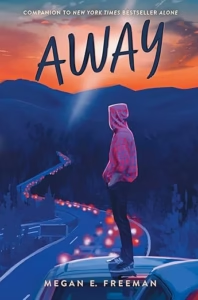Away
Megan E. Freeman
Simon & Schuster
Published February 11, 2025
Amazon | Bookshop | Goodreads
About Away
A group of children investigate the threat that prompted large-scale evacuations in this powerful and dramatic companion novel to the New York Times bestselling Alone told in multiple POVs.
After an imminent yet unnamed danger forces people across Colorado to leave their homes, a group of kids, including an aspiring filmmaker and a budding journalist, find themselves in the same evacuation camp. As they cope with the aftermath of having their world upended, they grow curious about the mysterious threat.
And as they begin to investigate, they start to discover that there’s less truth and more cover-up to what they’re being told. Can they get to the root of the conspiracy, expose the bad actors, and bring an end to the upheaval before it’s too late?
My Review
It’s a really weird time to read dystopian fiction set in the US, especially something centered around a possible environmental disaster and government conspiracies. Yet, here we are, and I’m grateful for books like this one and authors like Megan E. Freeman, who break down some of these ideas and questions into stories that make them accessible to middle grade readers. Stories allow us to ask questions and look at life from a perspective other than our own.
Anyway. After reading Alone, a companion novel to this one, I had a hard time imagining a new story set at the same time from multiple points of view. Alone was such a powerful story, though, that I knew I wanted to try this one, and I’m so glad I did.
I think the ensemble cast really worked in this book. Each character’s point of view presents in a slightly different way. Harmony tells her story in newspaper articles and letters to her journalist aunt. Teddy’s perspective comes in transcripts for video footage and storyboard images. Ashanti and Grandin relate their experiences in verse.
Those seem like disparate things, but I love the way that they come together. Each character also has a particular interest or area of expertise that comes in handy. Ashanti often compares things that happen to mythological stories. Teddy pulls comparisons from movies or documentaries. Harmony references famous history or journalists, especially Nelly Bly.
I loved that because that also reinforces the truth that understanding history, both the facts of our history and our culture through art and media helps give us context for the world we experience. Those things also teach us to think critically. And the story perfectly captures that process as this group of young teenagers walks it out.
The book also contains a lot of hope and encouragement, too. It’s about building community and working together and the value and impact of spreading truth. I think Away will find a home with a lot of readers looking for encouragement and hope right now.
Content Notes
Recommended for Ages 8 to 12.
Profanity/Crude Language Content
None.
Romance/Sexual Content
None.
Spiritual Content
Harmony’s mom is a Christian pastor. Reference to an interfaith council that plans an inclusive winter holiday celebration.
Violent Content
References to toxins and dangerous conditions prompting a massive evacuation.
Drug Content
None.
Note: This post contains affiliate links, which do not cost you anything to use but help support this blog. I received a free copy of this book in exchange for my honest review. All opinions are my own.
Marvelous Middle-Grade Monday
I’m sharing this post as a part of a weekly round-up of middle-grade posts called Marvelous Middle-Grade Monday. Check out other blogs with posts about middle-grade books today on Marvelous Middle-Grade Mondays at Always in the Middle with Greg Pattridge.
